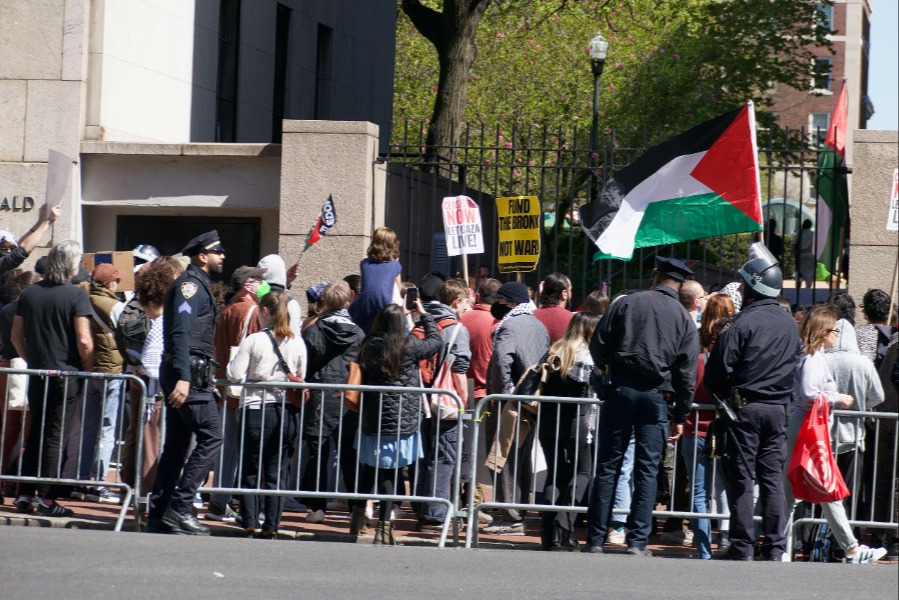Summary: Justice Department Policy on ‘Disclosure of Foreign Influence Operations’
On Sept. 25, the Justice Department announced a new policy on “Disclosure of Foreign Influence Operations” as part of an update of the U.S.
Published by The Lawfare Institute
in Cooperation With

On Sept. 25, the Justice Department announced a new policy on “Disclosure of Foreign Influence Operations” as part of an update of the U.S. Attorney’s Manual—now known as the “Justice Manual.” In announcing this first comprehensive review of the manual in more than 20 years, the department highlighted several specific policy changes and additions, including Section 9-90.730, which entails the guidelines for disclosing foreign influence operations.
Context
The new policy in Section 9-90.730 is the latest action by the Justice Department to address foreign influence campaigns, particularly those targeting the U.S. electoral system. In November 2017, FBI director Christopher Wray created a Foreign Influence Task Force within the FBI to “identify and counteract malign foreign influence operations targeting the United States.” A few months later, Attorney General Jeff Sessions announced the creation of a department-wide Cyber-Digital Task Force charged with advising Sessions on how the Justice Department can most effectively confront cyber threats, including foreign influence operations.
On July 2, 2018, the Justice Department task force released a report that focused in part on countering malign foreign influence operations, particularly those targeting U.S. elections. During a speech later that month at the 2018 Aspen Security Forum, Deputy Attorney General Rod Rosenstein noted the report’s recommendation that the department, in certain scenarios, should publicly disclose and attribute foreign influence operations. According to Rosenstein, “[e]xposing schemes to the public is an important way to neutralize them.” He went on to explain that “attribution of foreign influence operations can help to counter and mitigate the harm caused by foreign-government-sponsored disinformation.” Significant portions of that July 2 report were incorporated into Section 9-90.730 of the Justice Manual.
Section 9-90.730
Section 90.730 of Title 9 of the manual explains the Justice Department’s guidelines on public disclosure of foreign influence operations. The policy begins by listing types of covert activities by foreign governments that would be identified as“foreign influence operations,” defining them as activities with an underlying “inten[t] to sow divisions in our society, undermine confidence in our democratic institutions, and otherwise affect political sentiment and public discourse to achieve strategic geopolitical objectives.” The policy also notes that such activities often use technology to conduct “malicious cyber activity and covert or anonymous communication with U.S. audiences on a mass scale from abroad.” Importantly, Section 9-90.730 is clear that its scope is restrained to activities that the department can attribute with high confidence to foreign sources. Influence operations from “unknown or domestic sources not acting on behalf of a foreign government [are] beyond the scope” of 9-90.730.
The policy identifies six scenarios under which the Justice Department may disclose information it has collected on foreign influence operations. Three of those scenarios involve pre-existing law enforcement or intelligence responsibilities of the department: to support arrest and charge for federal crimes arising out of foreign influence operations; to alert victims of federal crimes arising out of foreign influence operations; or to alert congressional committees to significant intelligence activities. The remaining three scenarios represent more significant changes in Justice Department policy:
- “To alert unwitting recipients of foreign government-sponsored covert support, as necessary to assist in countering the threat.”
- “To alert technology companies or other private sector entities to foreign influence operations where their services are used to disseminate covert foreign government propaganda or disinformation, or to provide other covert support to political organizations or groups.”
- “To alert the public or other affected individuals, where the federal or national interests in doing so outweigh any countervailing considerations.”
The major policy change here is the explicit guidance on disclosure of foreign influence operations to the public or other affected individuals. Unlike the five scenarios, in the case of this sixth scenario the policy notes that the decision to alert the public entails weighing whether “federal or national interests in [public disclosure] outweigh any countervailing considerations.” The policy explains that there may be a federal or national interest in public disclosure of foreign influence operations that threaten to undermine confidence in the government or public institutions, risk inciting violence or other illegal actions, or may cause substantial harm, alarm or confusion if left unaddressed.
Section 9-90.730 also states explicitly that the department may choose not to make a public disclosure, if such disclosure would be “counterproductive.” For example, the department may decide not to publicly disclose a foreign influence campaign because doing so would “amplify or otherwise exacerbate” the message of that operation or because disclosure “may re-victimize the victim.”
The policy further enables the Justice Department to alert technology and social media companies of foreign influence operations that are using those companies’ services. Finally, it allows the department to “alert any unwitting recipients of foreign government-sponsored covert support.” While the policy does not explicitly state who these recipients may be, it’s noteworthy that the the same chapter of the July 2 report that laid out the recommendations on public disclosures also warns of the threat posed by foreign influence operations that offer financial, logistical, and campaign support to “unwitting politicians, party leaders, campaign officials or the public.”
Section 9-90.730 also highlights the following four principles and policies that the Justice Department “will be mindful of” as it decides to disclose information about foreign influence operations:
- “Partisan political considerations must play no role in efforts to alert victims, other affected individuals, or the American public to foreign influence operations against the United States. Such efforts must not be for the purpose of conferring any advantage or disadvantage on any political or social group or any individual or organization.”
- “In considering whether and how to disclose foreign influence operations, or the details thereof, the Department will seek to protect intelligence sources and methods, investigations, and other U.S. government operations.”
- “Foreign influence operations will be publicly identified as such only when the Department can attribute those activities to a foreign government with high confidence. Disinformation or other support or influence by unknown or domestic sources not acting on behalf of a foreign government is beyond the scope of this policy.”
- “Where a criminal or national security investigation during an election cycle is at issue, the Department must also be careful to adhere to longstanding policies regarding the timing of charges or taking overt investigative steps.”
Although this is the only direct reference to election interference within Section 9-90.73, this policy appears to reflect various lessons learned from Russian interference in the 2016 election. For example, even as Section 9-90.73 lays out the guidelines under which the Justice Department may disclose information about foreign influence operations, it concludes by explaining that an entity other than the Justice Department or the FBI might more appropriately make the public disclosure information about a foreign influence operation. This caveat appears to be consistent with the Obama administration's decision in October 2016 to have Director of National Intelligence James Clapper and the Department of Homeland Security be the public face of the accusation that the Russian government had directed the hack and release of Democratic National Committee emails.
In this context, it is notable that the section declares that the U.S.’s “democratic processes and institutions are strong and must remain resilient in the face of this threat.” In fact, Section 90.730 is the only section within Title 9 of the Justice Manual—which covers criminal matters—that mentions “democratic processes” or “democratic institutions.”
This change in Justice Department policy comes amidst recent warnings from the intelligence community of a “pervasive messaging campaign by Russia to try to weaken and divide the United States.” Tech companies, election security experts, and congressional staffers have all questioned whether the department and the rest of the Trump administration have been doing enough to combat meddling in future elections. Although Section 9-90.730 does not address all the concerns that have been raised, it represents an important step in promoting greater transparency for future foreign influence operations targeting U.S. elections.





